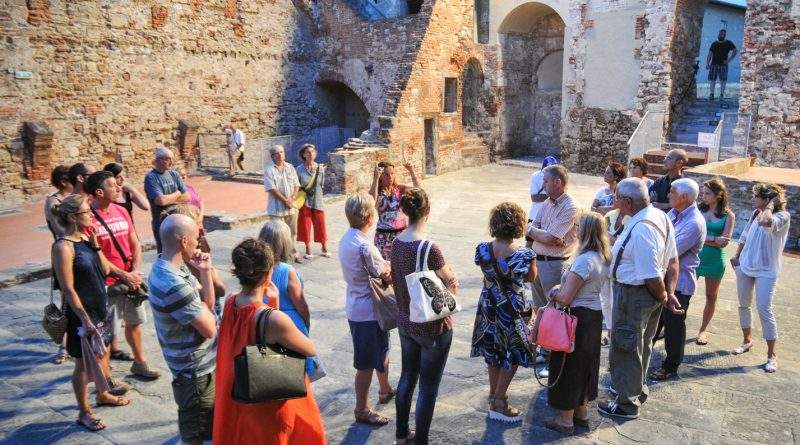There are sites that prevent tour guides from working: after the reopening of museums following the so-called lockdown, in fact, some cultural sites prefer to make use of in-house staff and do not let guides from outside work, despite the fact that security measures inside the museums allow guide activities to take place without major hiccups. One such case(later resolved positively) is that of Castel del Monte, where guides were not allowed to work for more than a month. Now the guides’ case also reaches Parliament, with an agenda presented last August 11 (but published only in the last few hours) by 5 Star Movement senator Marco Croatti.
“One of the economic sectors most affected in Italy by the serious epidemiological emergency from Covid-19,” Croatti begins in his odg, “is tourism, which can only recover with the full recovery of tourist flows to our country.” Still, Croatti points out, “the epidemiological crisis has caused an unprecedented crisis in the tourism sector, which has restarted thanks to the travels of Italians but is still far from normal levels due to the collapse of tourist flows from abroad, so much so that an estimate by the Italian National Tourist Agency estimates a 55 percent drop in such flows in 2020 compared to the previous year,” moreover, "for the tourism sector, the preparation, professionalism and competence of the operators constitute a strong point, and among these professionals, tour guides certainly stand out, bringing visitors to ’experience’ the places of Culture.
Croatti found that “with the resumption of activities in Phase 2, tour guides have encountered difficulties in carrying out the professional activities for which the state has licensed them.” The senator points out that, “for the performance of their activities, tourist guides must be allowed access in Italy to any place where visitors are admitted, regardless of the presence or absence of volunteers and janitors,” but he also notes that “often tourist guides are not allowed to exercise their activities in some sites due to the presence of in-house guides or the existence of exclusive agreements with local guides: in this way, a paradoxical situation is created for which visitors who have arrived with an external guide can make access, while the professional must remain outside the place of the visit.”
The Pentastelite parliamentarian recalls Article 117, letter e, of Legislative Decree 42 of Jan. 22, 2004 (the Cultural Heritage and Landscape Code), where it is stipulated that cultural assistance and hospitality services for the public, including guide services and educational assistance, may be established in institutes and places of culture. “However,” Croatti points out, “the invitations to tender for the concession of cultural assistance services for visitors do not impose an obligation on companies competing for the award to use licensed tour guides for guided tour services.”
Taking into account, therefore, that, according to Croatti, “such a mechanism creates distortions, in that ’in-house’ guided tour services are thus entrusted to self-employed workers or collaborators who are absolutely not licensed guides, who lack the title to exercise this activity that requires study, preparation and expertise, but who instead carry out de facto the profession of tourist guide without having obtained any kind of qualification.”, the agenda intends to commit the government “to take all appropriate steps to introduce a ban on the unqualified practice of the professional activity of tourist guide; to evaluate the advisability of providing, through interventions on the national discipline and by activating at the competent European fora, appropriate measures of a binding nature for all EU countries, aimed at ensuring that any licensed tourist guide, even in another EU country, can carry out his professional activity within all places of culture, except in the presence of imperative reasons, public safety and security or public order, in any case in accordance with the principle of proportionality.”
 |
| With Covid, tour guides often unable to work. The case in Parliament |
Warning: the translation into English of the original Italian article was created using automatic tools. We undertake to review all articles, but we do not guarantee the total absence of inaccuracies in the translation due to the program. You can find the original by clicking on the ITA button. If you find any mistake,please contact us.